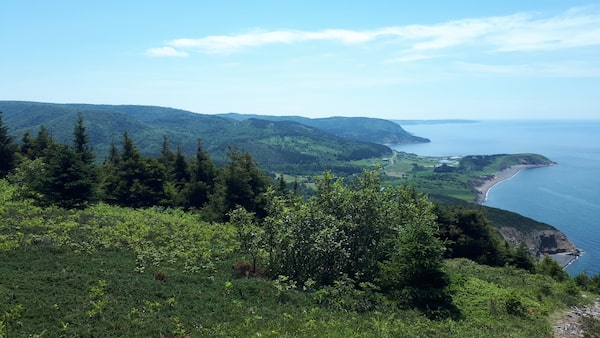
Scenic view from Lookoff River on Mabou Highland Conservation Land towards Mabou Mines and Cape Mabou Highlands Hiking Trails in Cape Breton are seen in this undated handout photo.�/The Canadian Press
Paul Abela is associate professor and acting head of Acadia University’s Department of Philosophy.
A pandemic has a funny way of making visible what’s been hiding in plain sight.
As we’ve all discovered recently, disorientation has displaced order as the modern condition. Like Job in the Bible, we find ourselves gazing into the whirlwind of a world suddenly out of joint. Social life has been replaced with social isolation. Employment with unemployment. Plans for the future have been given up to planning for next week.
Amidst this sea change, two elements of the human condition, often displaced, have come back into view.
First, as Aristotle articulated well more than two millennia ago, human beings are fundamentally social creatures. A solitary life of self-sufficiency, as he noted, belongs to beasts and Gods, but not to man. We flourish only in community with each other. That flourishing takes many forms - personal, social, economic and political.
As we’ve discovered, social intercourse isn’t something we can just switch off at will. Our nature is realized in social exchange. Modern mythologies of self-sufficient reason and rational planning notwithstanding, if the social contact is ended, we’re aborted creatures at odds with ourselves. The costs of that estrangement are substantial as we’ve begun to witness with private and social pathologies hatching out during this lockdown.
A second rediscovery prompted by the current disorientation is an upfront recognition of nature’s cruelty.
We’re not here wrestling with the aftermath of a man-made catastrophe such as a nuclear exchange. Nor is it – as in the economic crash of 2008 – a disaster brought on by hubris and greed. No, we’re in a standoff with a microscopic, mindless, nano-sized killer.
The idea that nature itself is the origin of our feeling of being adrift is deeply disconcerting, Over the past half-century we’ve tended to see in nature the ultimate foundation of our being-at-home in the world. Quietly, but perceptibly, the gulf left by the decline of religion in the West has been filled by an appeal to nature and naturalism. In different ways, the language of the contemporary generation has been one marked by how we have defiled and despoiled our natural home; whether in terms of pouring carbon dioxide into the air with resulting global warming, or degrading ecosystems, or exploiting nature’s limited resources and overwhelming her natural cycles.
Against this, the pandemic should serve as a poignant reminder of something we’ve really known since the time of Darwin. In honesty, nature is a blind, mindless slaughterhouse. Its murderous ways take place, conveniently, largely out of sight and out of mind. As Thomas Huxley, Darwin’s bulldog, put it in private correspondence: “There is amazingly little evidence of ‘reverential care for unoffending creation’ in the arrangements of nature, that I can discover. If our ears were sharp enough to hear all the cries of pain that are uttered in the earth by men and beasts, we should be deafened by one continuous scream.”
I am reminded of this fact each spring at my home in rural Nova Scotia. Around March or April we hear the return of morning birdsong. It’s a beautiful moment: a sense of return, of being-at-one with the rest of living reality. In a world of naturalism, it is a feeling that rivals the oceanic feeling that religion once offered. Sadly, it’s only a pleasant illusion. The beauty and apparent oneness with nature in fact hides an ugly horror show of starvation, cold, or death by predation. While the song returns – there is no silent spring – few of the self-same songbirds do.
Where our deepest need is to be “at home” in the world – as a philosopher I’m convinced this is the most primitive of our impulses – a pandemic makes visible the twin injunctions that human nature cannot be ignored and that external nature should not be exalted.
We are, in many ways, deeply paradoxical creatures: curious bipeds that can neither spontaneously and rationally jettison our evolved natural needs if we are to flourish, nor find rootedness in the estranged landscape of untutored nature.
We seem to be born cosmic orphans with no natural place of existential rest – a disquieting truth and condition.
But then again, perhaps it’s only in times of disorientation that we have the fleeting power to discern difficult truths – truths that, like the stars in the daylight sky, remain otherwise comfortably hidden.
Keep your Opinions sharp and informed. Get the Opinion newsletter. Sign up today.